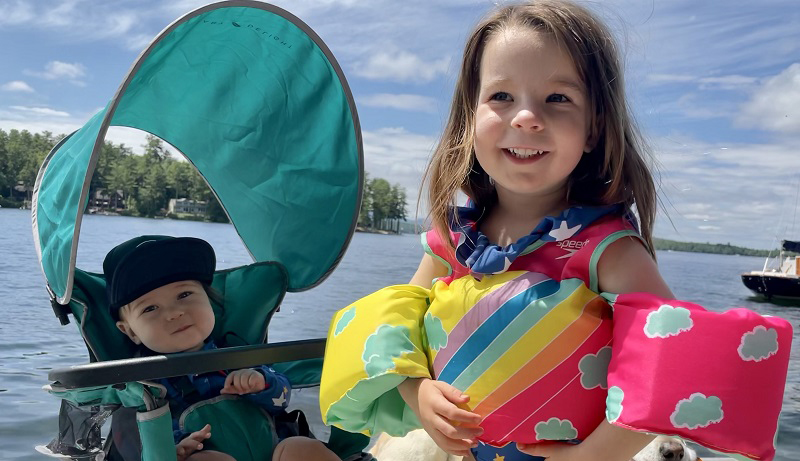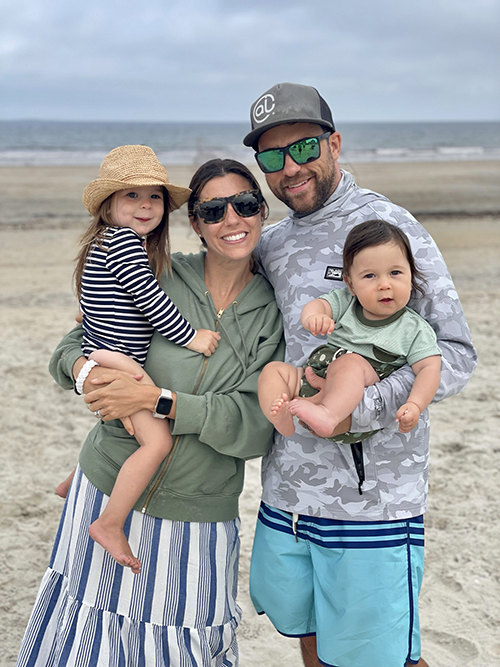The numbers can barely begin to describe the agony of pregnancy loss for Alex and Tim Lieto. Six years of medical interventions, ten rounds of in vitro fertilization (IVF) and six miscarriages, including a devastating loss at 19 weeks.
“Pregnancy loss is gut-wrenching,” said Alex, 34. “It’s a pain that you never imagined possible. It tears you apart. While it does get better with time, you never forget any of your losses.”

Luca and Faith Lieto
The couple, together since high school, were eager to start a family when they married in their mid-20s. But after 6 months of trying to get pregnant, they decided to consult a local fertility clinic. Alex and Tim were told that male-factor infertility was at play. The program’s health care providers were pessimistic about the possibility of success, so the Lietos sought a second opinion.
Having family who worked at Brigham and Women’s and a referral from friends, they scheduled an appointment with the Center for Infertility and Reproductive Surgery at Brigham and Women’s Hospital. The Center offers an array of procedures and services to treat infertility, which can have many causes.
Although we were initially attracted to Brigham and Women’s because of its unbelievable reputation, the minute we met [the team], we knew it was a match,” said Alex.
And persevere, they did — through many rounds of IVF, hopes raised and then dashed. The process typically takes many weeks per treatment cycle, and involves using medication to induce production of multiple eggs, extracting the eggs from the patient and fertilizing them with sperm in a Petri dish. Embryos are then placed into the uterus (womb) using a thin catheter (tube). This part of the process would go smoothly, but eventually Alex would lose the pregnancy.
Eager to do whatever she could to reduce the chance of loss, Alex overhauled her diet, did lots of yoga, meditated, joined a support group and continued attending church regularly. She quit her job in human resources to devote herself full-time to their quest for a child.
Their last loss was the most excruciating: a son the couple named George, who was lost in utero at 19 weeks. Alex delivered the baby at the Brigham and the nurses made the tragedy bearable, she said.
“They made us feel like he was the most beautiful, special baby and that although this was a profound loss, it was still an important time for us,” Alex explained. “I remember one nurse holding my hand and telling me that I was a mother, despite what happened.” The nurses also created a box of keepsakes, containing photos of George, inked prints of his hands and feet, and handmade items including a knitted blanket — something that the couple would cherish forever.
The couple started exploring surrogacy and even adoption. Meanwhile, their care team began thinking more broadly about the possible reasons for Alex’s recurrent pregnancy loss, which was now a separate issue from infertility. That meant exploring all immunologic and metabolic reasons for her pregnancy losses.
Reproductive immunology concerns itself with the relationship between the embryo and the mother’s body — simply put, why the latter sometimes rejects the former. It’s a relatively unexplored field with very few experts. Testing revealed that Alex was unable to effectively break down blood clots and had a rare form of insulin resistance that caused blood sugar spikes. She began taking medication for both conditions.

The couple decided to do one more round of IVF, which resulted in just two fertilized eggs out of a dozen retrieved. Not great odds, and they worried whether testing would reveal healthy embryos. Alex will never forget a phone call from her care team one very snowy February evening.
“One embryo had tested as genetically normal,” recounted Alex. That embryo eventually became Faith, now 2 ½ — smart, funny, outgoing and a lover of the beach — the first grandchild on both sides of the family. Two years later came Luca, again with the help of IVF, a smiley and snuggly eight-month-old who is in love with his big sister, according to Alex.
Alex said the Brigham team was remarkable. “Everyone we dealt with was wonderful. The nurses were outstanding and the ultrasonographers were incredible. For someone like me, ultrasound rooms are very scary. But the ultrasonographers were caring and compassionate and so respectful of what we had been through.”
Alex sometimes looks at her wedding photos and marvels at how innocent she and Tim were, standing at the altar. “In that moment, I remember dreaming about the family we were going to make and the children we would have together. I had no idea what we were about to embark on, but would I do it again? In a heartbeat. Again and again. Our kids are everything.”
For over a century, a leader in patient care, medical education and research, with expertise in virtually every specialty of medicine and surgery.
About BWH